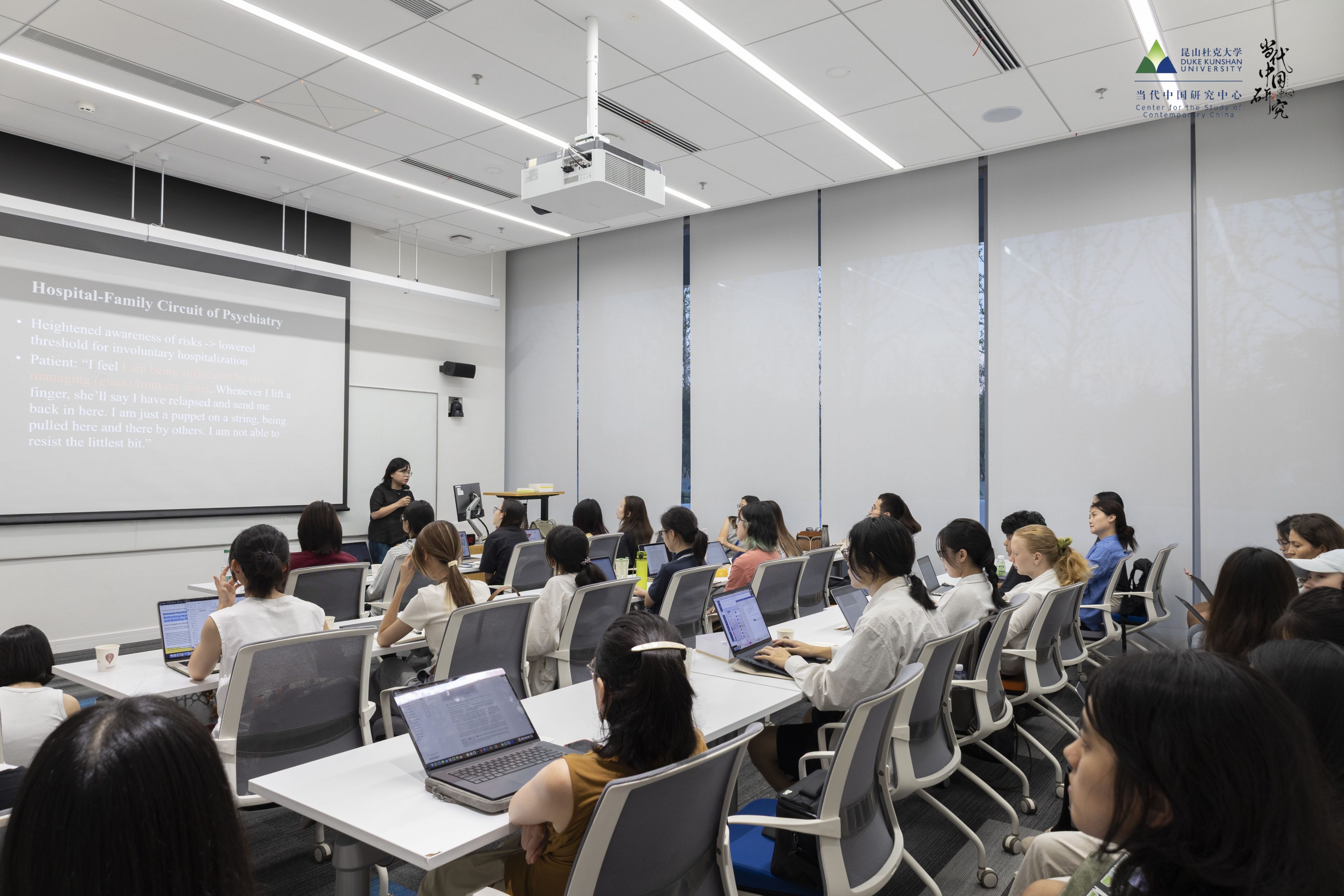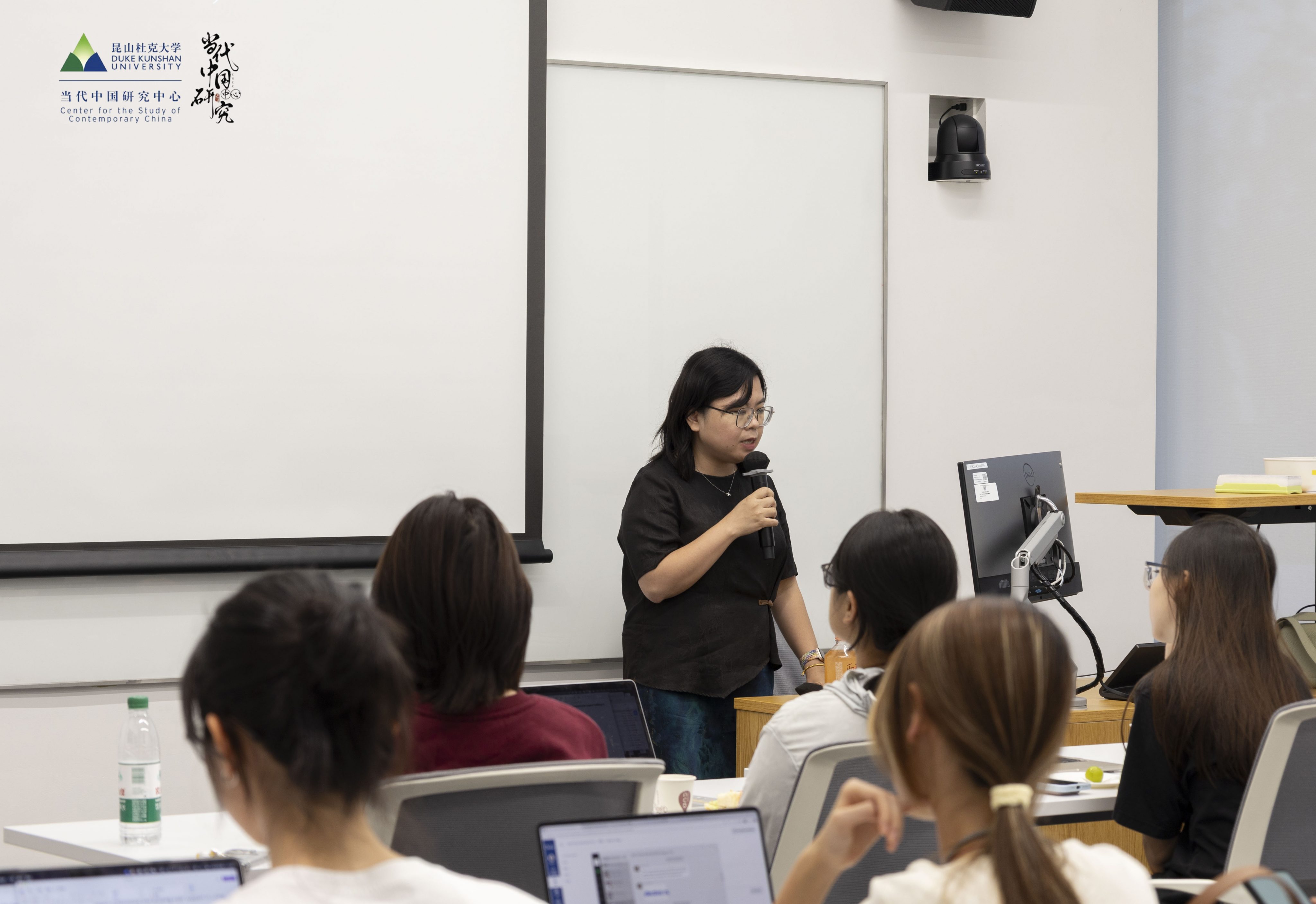By Feifei Luo, Class of 2027
On September 15th, 2025, the Cluster for Gender and Global China hosted a guest lecture by Dr. Zhiying Ma from the Crown Family School of Social Work, Policy and Practice at the University of Chicago, bringing together DKU faculty and students to discuss her new book, Between Families and Institutions: Mental Health and Biopolitical Paternalism in Contemporary China. This book explores how the risk management of mental illness patients in China is assigned to families by the government, developing the idea of “biopolitical paternalism”. Given the challenges faced by patients and their family members as caregivers under this top-down management, Dr. Ma proposed peer support as an alternative way of psychiatric care.

Dr. Ma started her research by asking why family is playing such a critical role in psychiatric care in China, since statistics show that most psychiatric inpatients are hospitalized involuntarily in the family after the 1980s. With an over 30 months of ethnographic fieldwork that covers psychiatric hospitals, community teams, social work agency and families in Guangdong, she discovered that the management of perceived behavioral risk of psychiatric patients in China mostly centers around a concept guan管. In Chinese, this word has multiple meanings: control, care and manage, resulting in a paradox. On one hand, guan is used by the state as an institutional risk management method, which produces biopolitical indifference. Its occurrence in official documents often determines family’s obligation to guan. The Mental Health Law establishes guan as a key principle of mental health work, while relegating it mostly to patients’ families. On the other hand, as a cultural ethics of parenting, guan is also understood as a cultural ideal that aims at making a positive difference. With the case of Tingting, Dr. Ma illustrated how the phenomenon of family taking care of mental illness patients is in line with China’s cultural norms, as well as with the parenting idea of “doing it all for your own good”. Both interpretations of guan push families to assume primary responsibility for patients. By blurring and merging multiple meanings in guan, the state configures the role of the family in psychiatry, assigning it the task of managing the perceived behavioral risk of people with mental illnesses, resulting in a transformation of intimate relationships to an extension of institutional logic.
The burden placed on families generates multi-layered challenges. For patients, being hospitalized entails a lack of autonomy brought by double paternalism from both the state and the family. For caregivers, as main agents, payers and brokers for hospitalization, their obligation to guan can be “an uphill battle everyday”, filled with emotional heartbreak and physical exhaustion.

To address these problems in current family-centered psychiatric management, Dr. Ma examined peer support as an alternative future service. With the help of trained peer supporters who also experienced mental illness in the past, it is expected that the burden on families of psychiatric patients can be eased. Dr. Ma and her team had already carried out pilot programs in Guangdong and had observed an improvement in social relations among supported patients. Their work also shows that participatory decision-making beyond the paternalistic logic is possible in China’s psychiatric care.
The talk was followed by a vibrant discussion. Many questions reflected students and faculty’s curiosity towards the feasibility of peer support service, particularly regarding implementation practices, the analysis of program outcome, as well as the advantages of this service over the original family-centered management. In response, Dr. Ma emphasized that peer support is not guaranteed as a definitive answer and that family members remain crucial allies. More efforts are needed in “rethinking governance” and “reimagining care” to explore a better future in China’s psychiatric care.


